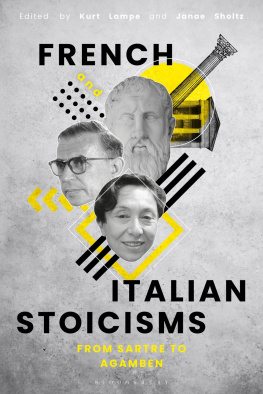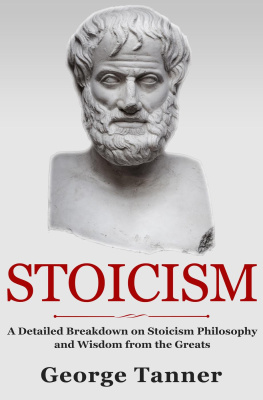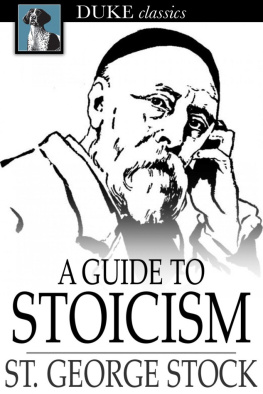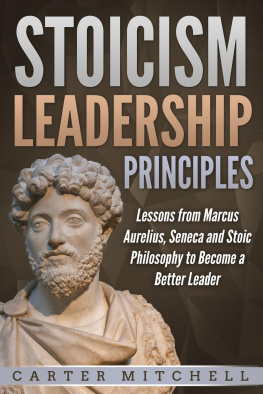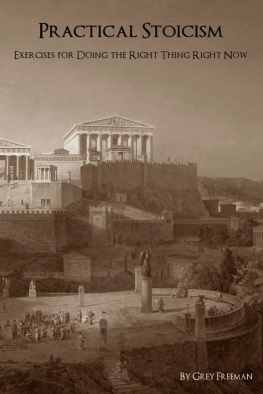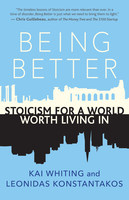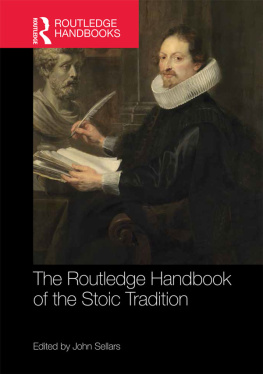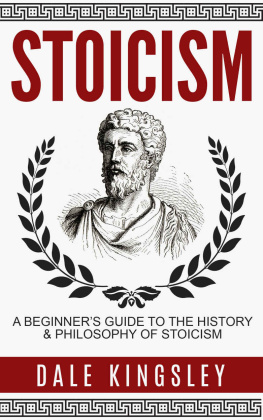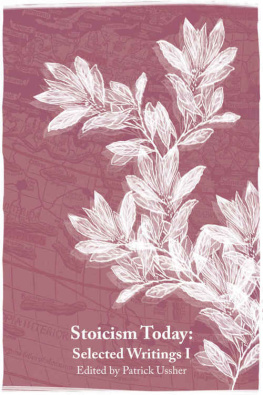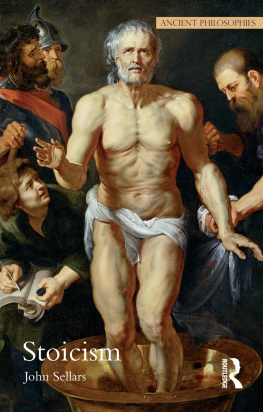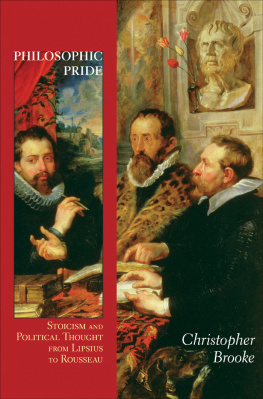French and Italian Stoicisms
Also Available from Bloomsbury
German Stoicisms: From Hegel to Sloterdijk , ed. Kurt Lampe and Andrew Benjamin (forthcoming)
The Art of Living Well , Paul van Tongeren, trans. by Thomas Heij
The Selected Writings of Pierre Hadot , trans. by Matthew Sharpe and Federico Testa
French and Italian Stoicisms
From Sartre to Agamben
Edited by
Kurt Lampe and Janae Sholtz

Contents
Kurt Lampe
Olivier DJeranian, trans. by O. DJeranian and Kurt Lampe
Laurent Husson and Suzanne Husson, trans. by Kurt Lampe
Janae Sholtz
Thomas Bnatoul
Kurt Lampe
John Sellars
Valry Laurand
Michael Ure
Barbara Cassin, trans. by Steven Corcoran and Kurt Lampe, with an Introduction by Kurt Lampe
Nicoletta di Vita, trans. by Kurt Lampe
Clifford A. Robinson
Matthew Sharpe
This volume began life as one half of a networking project funded by the Arts and Humanities Research Council of the United Kingdom in 2016 under the title Continental Stoicisms: Beyond Reason and Wellbeing. We are grateful for their support.
FIGURE
Hadots Epictetan key to (later Roman) Stoicism as a way of life |
Chapters 2, 3, 10, and 11 were originally written in French. Their authors are discussing primary sources written not only in French and English but also in ancient Greek, Latin, Italian, and German. Because translation is already a matter of interpretation, I considered it unwise to adopt published English translations of the sources they are quoting (where they exist). My translation is therefore based on four principles: first, I have consulted the sources quoted in the original language; second, I have compared this with the way the authors have rendered these sources into French; third, I have borne in mind existing anglophone conventions around technical terms. For instance, with respect to ancient Greek and Roman Stoic sources, in almost all cases I have followed the conventions established by Anthony Long and David Sedleys seminal sourcebook and commentary, The Hellenistic Philosophers (1986). The fourth step was of course to ask the authors themselves to critique and verify my translations.
The only generalization worth mentioning is that I have attempted to disambiguate French signification and sens throughout, since the distinction is sometimes philosophically significant. I have accordingly translated signification as meaning wherever appropriate; in some contexts, I have instead used signification. I have translated sens as sense rather than meaning.
Kurt Lampe
Cic. | Cicero |
Fat. | De Fato ( On Fate ) |
Fin. | De Finibus ( On Ends ) |
ND | De Natura Deorum ( On the Nature of the Gods ) |
Off. | De Officiis ( On Obligations ) |
Tusc. | Tusculanae Disputationes ( Tusculan Disputations ) |
DL | Diogenes Laertius , Lives of the Illustrious Philosophers |
Epict. | Epictetus |
Ench. | Enchiridon (i.e., Manual ) |
Diss. | Dissertationes (i.e., Discourses ) |
LS | A. A. Long and D. N. Sedley (1986), The Hellenistic Philosophers , 2 vols., Cambridge: Cambridge University Press. |
MA | Marcus Aurelius |
SE M. | Sextus Empiricus, Adversus Mathematicos ( Against the Professors ) |
Sen. | Seneca |
Ben. | De Beneficiis ( On Benefits ) |
Ep. Mor. | Epistulae Morales ( Moral Letters ) |
Prov. | De Providentia ( On Providence ) |
Tranq. | De Tranquillitate ( On Tranquillity ) |
SVF | Hans von Arnim (19035), Stoicorum Veterum Fragmenta , 4 vols., Leipzig: Teubner. |
Kurt Lampe
1 The Meaning(s) of the Stoic Tradition
What is the significance of the Stoic tradition? That, of course, is an unwieldy question: the concepts, arguments, doctrines, mental and practical techniques, and everything else that travels under the label Stoicism have meant different things to different people. Today we have an increasingly detailed understanding of the aspects of ancient Stoic theory preserved by surviving ancient Greek and Roman sources. The academic study of this evidence, which until the 1980s was concentrated in German and French scholarship, is now flourishing in anglophone universities as well. There is also a growing body of research about the reception of Stoicism from antiquity until today (e.g.,
Dwelling briefly on this movement will shed some light on how the reception of Stoicism in continental (European) philosophy enriches its significance. While it is hazardous to generalize, the following quotation from the front cover of Donald Robertsons excellent Stoicism and the Art of Happiness is both concise and representative: What is Stoicism? Practical wisdom and resilience building techniques. Take controlunderstand what you can and cant change (
Now contrast the following passage from a section called In the Garden of Epictetus in The Education of the Stoic by the Portuguese author Fernando Pessoa (18881935):
The pleasant sight of these fruits and the coolness given off by these leafy trees are yet other solicitations of nature, said the Master, encouraging us to abandon ourselves to the higher delights of a serene mind.... Sit still with me, and meditate on how useless effort us, how alien the will, and on how our very meditation is no more useful than effort, and no more our own than the will. (: 51)
Since Pessoa (or rather his heteronym, the Baron of Teive) puts these words into Epictetuss mouth, he implicitly questions to what extent anything is under our control, including our thoughts: Our very meditation, he muses, is... no more our own than the will. We could relate this to the ancient Stoics own attempts, given their commitment to universal causal determinism, to explain in what sense our decisions belong to us (LS 55, 62; cf.
Pessoa was a younger contemporary of Jean-Paul Sartre, the earliest modern philosopher addressed in the present volume, and features prominently in Handbook of Inaesthetics by Alain Badiou, at the opposite chronological end of our coverage. The two broad themes I have just identified in the quotation from his work, which I shall encapsulate under the headings language and freedom, recur frequently in French and Italian reception of Stoicism. This reception tradition, it should be emphasized, is a complement rather than a competitor to modern Stoicism. One of the French authors concerned, Pierre Hadot, is frequently cited in modern Stoic literature. As Matthew Sharpe elucidates, Hadots readings incorporate both prior German and French scholarship and a range of philosophical influences (Sharpe, Ch. 13). Nevertheless, it remains true that continental philosophers tend to develop the meaning of the ancient evidence with greater creative latitude than modern Stoics. On the one hand, they explain aspects of Stoic practice differently than the practitioners themselves, and in this respect expand our understanding of the Stoic life. On the other, they discover significance in theorems that the original theorists would probably disavow, and in that respect envisage ways of living Stoicism quite different from those practiced in the ancient world or the mainstream of the modern Stoic movement.

